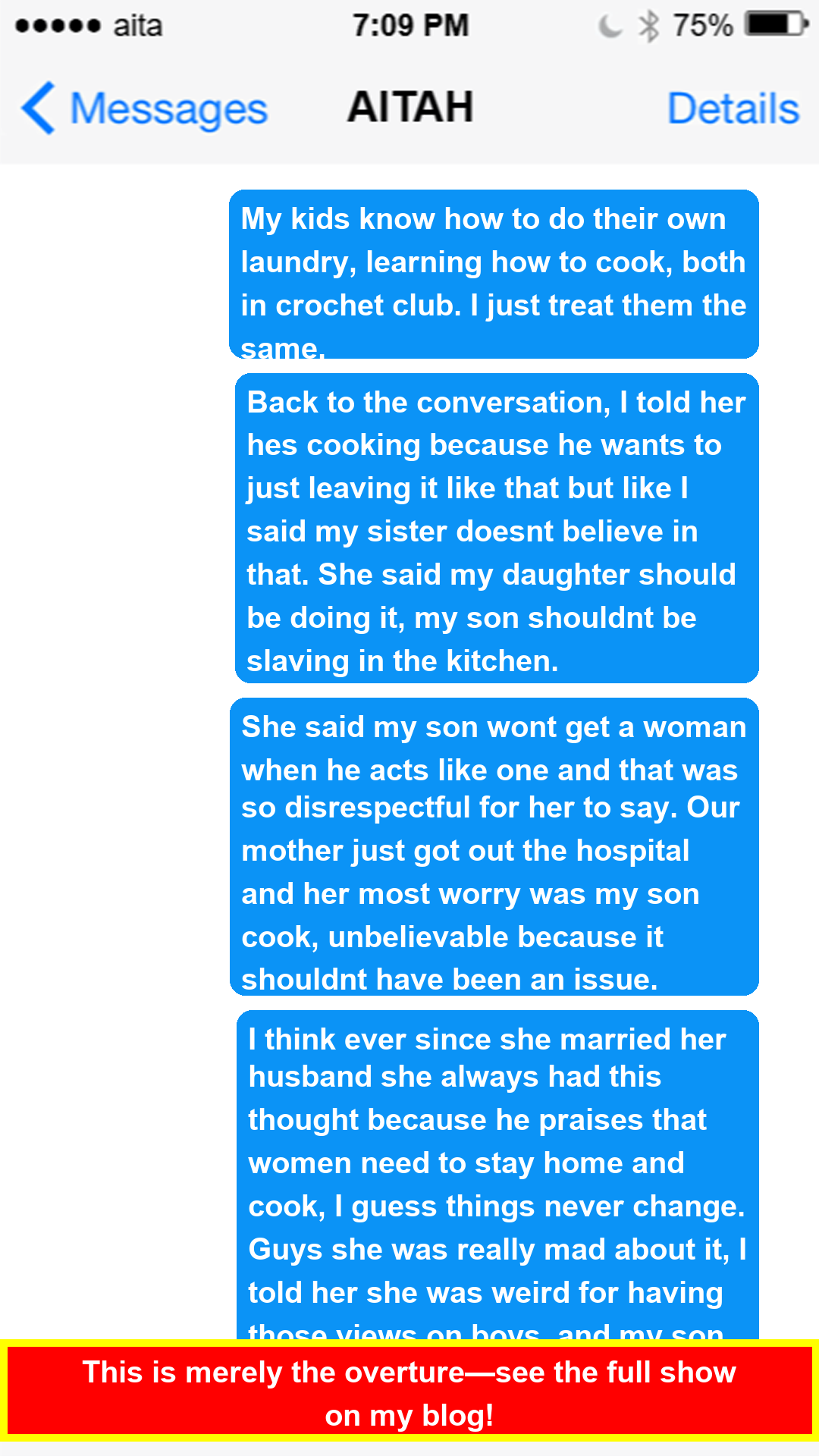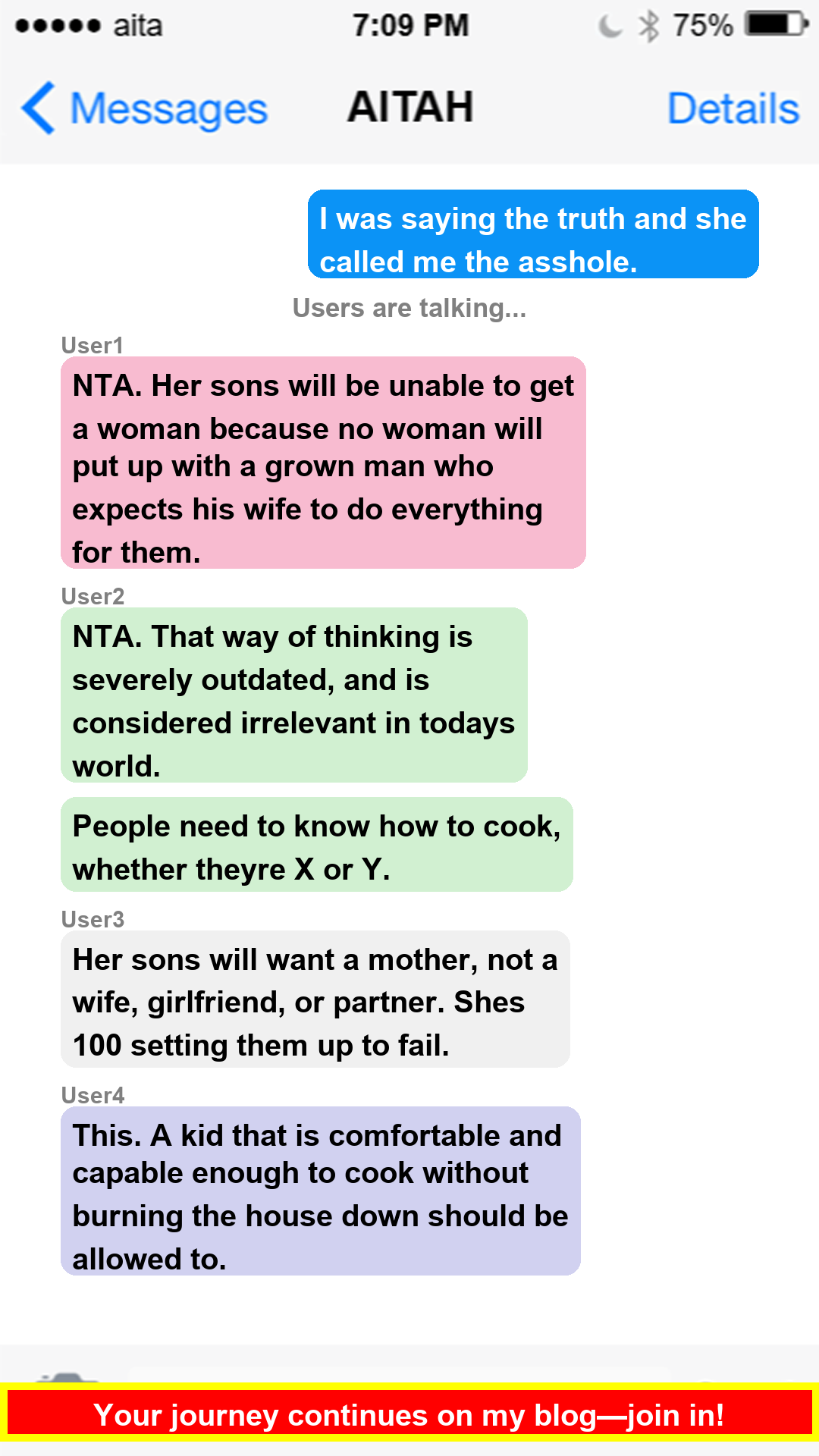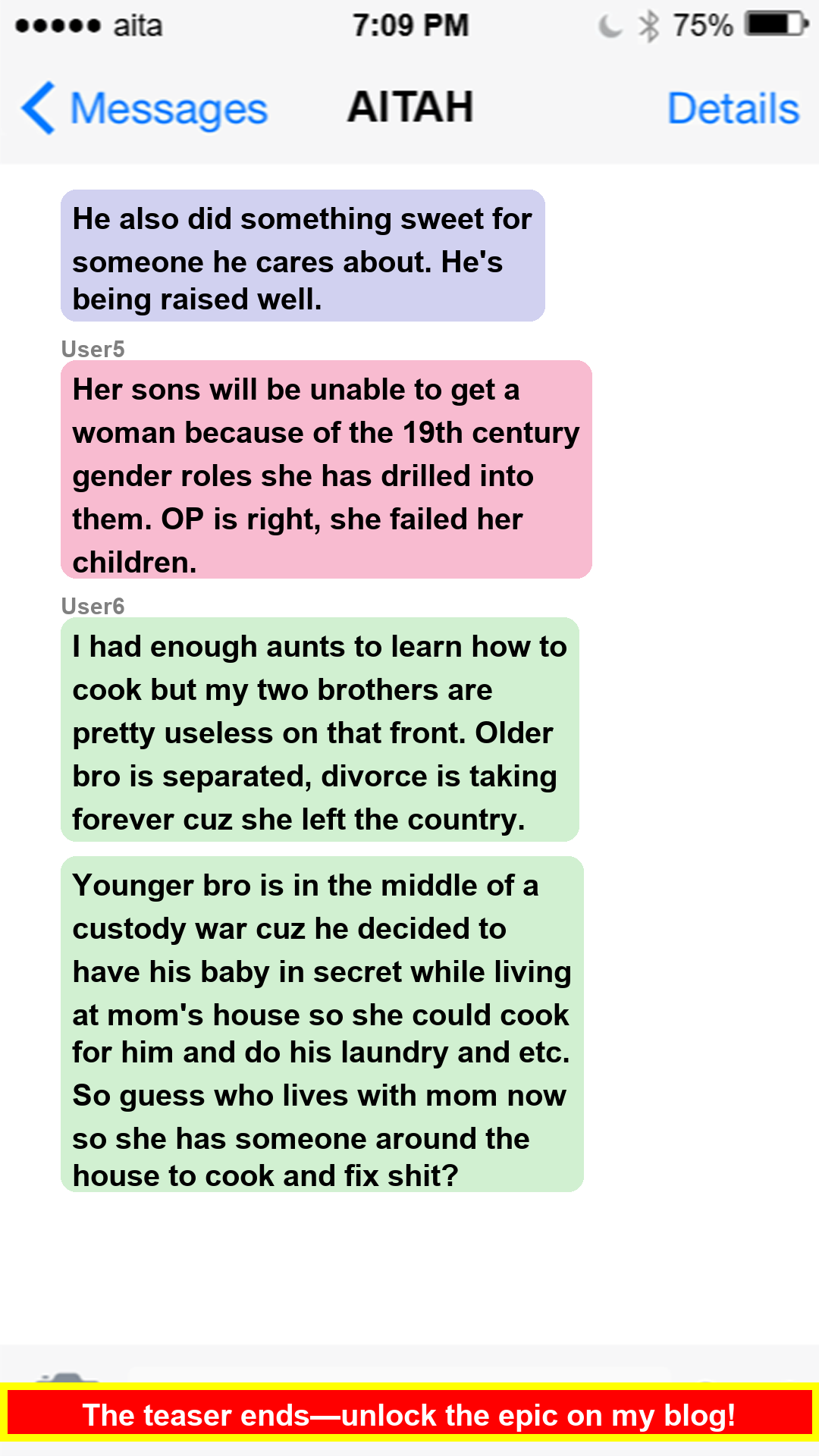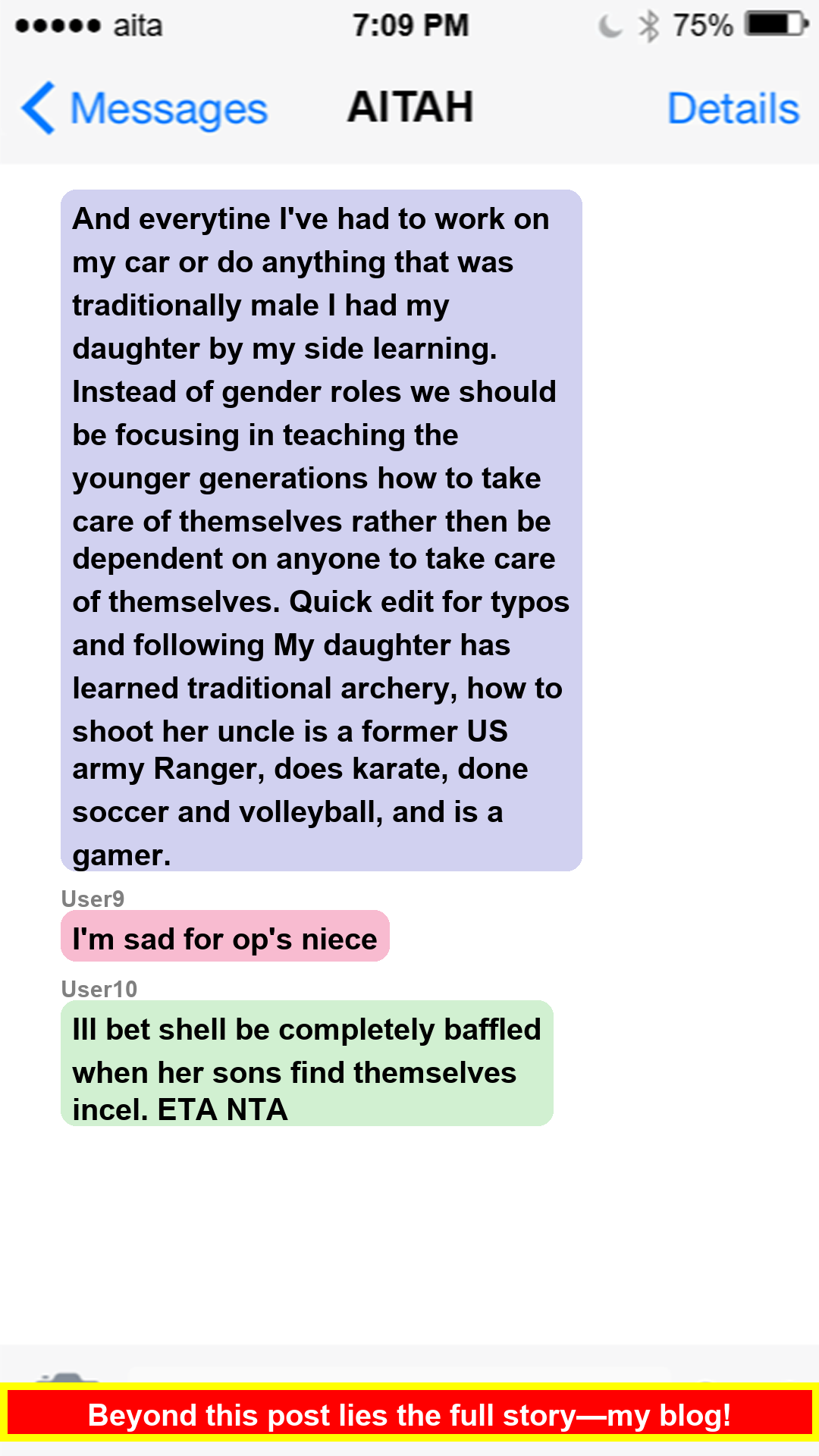Aita for calling my sister weird for how she views boys?
 Image credit: Pixabay (This is example image – Not the actual photo)
Image credit: Pixabay (This is example image – Not the actual photo)
When Family Values Clash: A Cooking Controversy
In a heartfelt family gathering, a mother faces unexpected tension when her son decides to cook his grandmother’s favorite seafood dish, challenging traditional gender roles. As her sister criticizes the boy’s choice to cook, insisting that such tasks are only for girls, a heated debate about parenting styles and gender expectations unfolds. This relatable story highlights the ongoing struggle many families face in balancing modern values with outdated beliefs, making readers reflect on their own experiences with gender norms in domestic life.
Family Drama Over Cooking: A Conflict Resolution Story
In a recent family gathering, tensions arose when differing parenting styles clashed over a simple act of cooking. The situation unfolded as follows:
- Background: The narrator’s mother had recently been discharged from the hospital and invited the family over to spend time with her. The narrator’s children had a day off from school, making it a perfect opportunity for a family visit.
- Cooking Plans: The narrator intended to prepare a meal for their mother but was met with enthusiasm from their son, who wanted to cook his grandmother’s favorite seafood dish instead. The narrator supported this decision and purchased the necessary ingredients.
- Family Dynamics: Upon arriving at the mother’s house, the narrator’s sister and her children were also present. The narrator’s son began cooking in the kitchen, which led to a confrontation with the sister, who held traditional views on gender roles.
- Sister’s Perspective: The sister expressed disapproval of the son cooking, believing that household chores should be the responsibility of girls. She has two sons and a daughter and enforces strict gender roles in her parenting.
- Narrator’s Response: The narrator defended their son’s choice to cook, emphasizing that cooking and cleaning are skills everyone should learn, regardless of gender. They pointed out that their children are taught to be self-sufficient and share household responsibilities.
- Escalation of Tension: The sister insisted that the daughter should be the one cooking, claiming that the son would not find a partner if he continued to “act like a woman.” This comment was perceived as disrespectful by the narrator.
- Underlying Issues: The narrator speculated that their sister’s views may have been influenced by her husband’s traditional beliefs about gender roles, which further complicated the family dynamics.
- Conclusion: The argument escalated, with the narrator calling out their sister’s outdated views. In response, the sister labeled the narrator as the “asshole” for defending their son’s right to cook.
This incident highlights the ongoing family drama surrounding differing parenting philosophies and the challenges of conflict resolution in a family setting. The situation serves as a reminder of the importance of open communication and respect for individual choices, especially in the context of modern gender roles.
This is Original story from Reddit
 Image credit: Pixabay (This is example image – Not the actual photo)
Image credit: Pixabay (This is example image – Not the actual photo)
Story
My kids have school off, so my mom invited us over to spend time with her since she got out of the hospital. It would make her feel better to have her family around.
I was going to cook my mom something, but my son insisted he wanted to make his grandma her favorite dish. My mom loves seafood, so he decided to make that. I brought everything from the store before going to my mom’s house; my sister and her kids were there.
When my son cooks, he hates when everyone is in the kitchen, so everyone was outside on the patio. My sister came outside with a weird look on her face. She asked me why my son was in the kitchen cooking; the way my sister and I parent is different.
She has two sons and a daughter. She believes that boys shouldn’t do the housework, like cooking or cleaning; she thinks it’s only for girls. I’ve seen the way she does it; her daughter has to help cook, clean, and she has to wash her own clothes.
It’s not my place to tell my sister how to parent, but one day I told her about herself. I told her she’s going to fail her sons, and when her daughter stops talking to her when she gets older, it’s her fault. My sister doesn’t let her sons do anything, and she does it for them.
I just don’t think it’s fair how she views girls. I don’t care what gender you are; cooking and cleaning is for everyone to do. My kids know how to do their own laundry, learning how to cook, both in crochet club. I just treat them the same.
Back to the conversation, I told her he’s cooking because he wants to, just leaving it like that. But like I said, my sister doesn’t believe in that. She said my daughter should be doing it; my son shouldn’t be slaving in the kitchen.
She said my son won’t get a woman when he acts like one, and that was so disrespectful for her to say. Our mother just got out of the hospital, and her most worry was my son cooking, unbelievable because it shouldn’t have been an issue. I think ever since she married her husband, she always had this thought because he praises that women need to stay home and cook; I guess things never change.
Guys, she was really mad about it. I told her she was weird for having those views on boys and my son. I was saying the truth, and she called me the asshole.
View the Original Reddit Post Here
Summary of Reddit Comments
The top Reddit comments reveal a strong consensus around NTA due to the outdated gender roles being imposed on the sons and the importance of self-sufficiency. Most users agree that the mother is setting her children up for failure by not teaching them essential life skills, which could hinder their future relationships and independence.
Overall Verdict
NTA
Expert Advice for Resolving Family Conflict
Family conflicts, especially those rooted in differing values and beliefs, can be challenging to navigate. Here are some practical steps to help resolve the situation between the narrator and their sister while fostering understanding and respect for each other’s perspectives.
Steps for Conflict Resolution
- Open a Dialogue: Encourage both parties to sit down for a calm conversation. It’s essential to create a safe space where each person can express their feelings without interruption. This can help in understanding the underlying emotions driving their perspectives.
- Practice Active Listening: Each party should practice active listening. This means truly hearing what the other person is saying, acknowledging their feelings, and refraining from formulating a response while the other is speaking. This can help reduce defensiveness and promote empathy.
- Share Personal Experiences: The narrator could share personal anecdotes about the importance of teaching children life skills, including cooking, regardless of gender. This can help the sister see the practical implications of her views on her children’s future.
- Address Gender Roles Respectfully: The narrator might gently challenge the sister’s views on gender roles by discussing how modern society values equality and self-sufficiency. It’s important to frame this discussion in a way that doesn’t come off as confrontational but rather as an invitation to rethink traditional beliefs.
- Find Common Ground: Identify shared values, such as the desire for children to be happy and successful. This can help both parties see that they ultimately want the same thing, even if their methods differ.
- Set Boundaries: If the conversation becomes heated, it’s okay to take a break and revisit the discussion later. Setting boundaries around how to communicate respectfully can prevent escalation and allow for more productive dialogue.
- Encourage Compromise: Explore potential compromises that respect both perspectives. For example, the sister could agree to allow her son to cook occasionally, while the narrator could acknowledge the importance of teaching their daughter traditional skills if that aligns with their values.
- Follow Up: After the initial conversation, it’s important to check in with each other. This can help reinforce the progress made and ensure that both parties feel heard and respected moving forward.
Conclusion
Family dynamics can be complex, especially when differing values come into play. By approaching the situation with empathy, open communication, and a willingness to understand each other’s perspectives, the narrator and their sister can work towards a resolution that honors both their beliefs and fosters a supportive family environment.
Join the Discussion
 Image credit: Pixabay (This is example image – Not the actual photo)
Image credit: Pixabay (This is example image – Not the actual photo)
What do you think? Would you have handled this differently?
Share your thoughts below! Vote: Do you agree with Reddit’s verdict?






